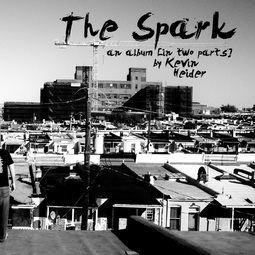|
Some songs are conceived and born quickly. And some of those songs, like "Yesterday,” are game changers. But other times, you've just got to work and work and work. You've got to sculpt the songs into the little pieces of perfection that you are absolutely positive they are meant to be. That's exactly what it would seem Kevin Heider has done with his ambitious double-album, The Spark. The songs were written over a period of six years in a myriad of styles. During that time, Heider has found himself chosen as the winner of songwriting contests and performing for the Embassy of the Republic of Guyana. When not spending time at home in Baltimore, Maryland, he's travelling and playing wherever people will listen. The Spark is an album unlike anything I've heard for a while. It feels as sprawling and involved as a Sufjan Stevens record, though that is only in terms of scope. Musically, this album is very, very heavily influenced by roots rock, Americana and folk music. It's an album that really couldn't be born outside of the American experience. Right from the get-go, the album pays homage to the gospel music born of the 1930s with "St. Brigid's Fire.” It pulls much of its structure and arrangement from “When The Saints Go Marching In” and does so with equal parts of reverence and disregard by turning it into a glorious drinking song. Each half of the album explores an aspect of being a human, the first looking at one's worldview and the second looking into the search for love and stability. "All I Want (Love Come Alive)" and "Can't Have My Money" are all about our motivations for love and whether we are willing to put that love up for sale. For straightforward folk/pop, take a listen to "Enola's Wake" and "These Fallen Castle Walls.” The last tracks of Part 1 deal with the unfortunate reality that the world we know today was built upon slavery and that there is pain in this life. Part II is, as I mentioned earlier, all about the search for love and stability. It tells the story of a man who is constantly in transit and away from the one that holds his heart. Each song seems to be told from a different city and gives this half of the album a travelogue feel. Normally, such subject matter leads to a sound more like Hawthorn Heights, but not here. There is no motivation to "slit my wrists and black my eyes" with Heider's story. The songs feel full of motivation, action and acceptance. It's as if he is saying, "I'm not where I want to be right now but I won't be this way forever." The songs take the same stance musically. You start to worry a bit as "Lonely in St. Louis" begins, but it turns itself into a great rock song. "Baltimore" is equally upbeat but finds its driving force from hand percussion and harmonicas. The album continues on this path before it begins to mellow out toward its conclusion. There, songs have almost no percussion and they are decidedly slower and more contemplative. "A Thousand Apologies" doesn't even have vocals, just a beautifully performed piano. To be frank, the ending of the album reminds me of recent Sleeping At Last albums. If I had to sum up my feelings about this album, it would be this: I've added this to my music collection and I am probably going to be listening on repeat for a good long while
0 Comments
Your comment will be posted after it is approved.
Leave a Reply. |
Critique/insightWe are dedicated to informing the public about the different types of independent music that is available for your listening pleasure as well as giving the artist a professional critique from a seasoned music geek. We critique a wide variety of niche genres like experimental, IDM, electronic, ambient, shoegaze and much more.
Are you one of our faithful visitors who enjoys our website? Like us on Facebook
Archives
July 2024
|

